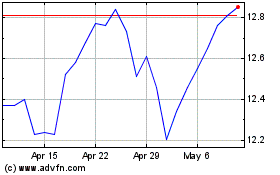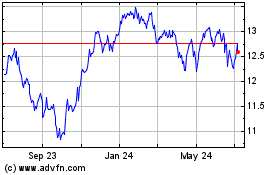By Heather Haddon
This article is being republished as part of our daily
reproduction of WSJ.com articles that also appeared in the U.S.
print edition of The Wall Street Journal (April 10, 2019).
Yogurt's big sales run has expired.
Chobani LLC helped make yogurt one of the most fashionable foods
of the past decade, championing a natural and healthy aesthetic
that won over consumers. That became a model for other big food
companies that have since remade products across the supermarket to
include fewer artificial additives and more natural
ingredients.
Danone SA and General Mills Inc. overhauled yogurt recipes and
branding to match the wholesome trend. Startups have recently
broadened the category to include "yogurts" made from plants, not
dairy.
The changes have left some consumers confused. U.S. yogurt sales
have fallen in each of the past two years after a decade of growth,
according to Euromonitor International, a market-research firm.
"I don't even know what I'm looking for most of the time," said
Sara Gray, a 47-year-old teacher and mother in McKinney, Texas. She
said she was stumped by the blizzard of yogurts that confronted her
at her local Kroger Co. store. "Can I just get some
strawberry?"
The average U.S. supermarket carries 306 different yogurt
varieties, according to brand sales and marketing agency Acosta, up
4% since 2015. Overall yogurt sales fell 6% by volume in the year
through February, Nielsen data shows. Sales of Greek yogurt, which
kick-started the category's explosive growth, fell 11%.
The decline of the yogurt boom is a troubling sign for
packaged-food companies that have struggled for years to grow
sales. Many of their decades-old brands are losing market share to
more health-oriented startups and cheaper store-branded
alternatives.
Peter McGuinness, Chobani's chief marketing officer, said yogurt
makers undermined their own sales by introducing too many new
flavors and styles. "It's self-inflicted," he said.
French dairy company Danone, the biggest yogurt maker in the
U.S. with brands that include Dannon and Oikos, saw unit sales
decline through March, according to Nielsen data provided by a
packaged-food company. Yogurt sales from General Mills, Fage
International SA and Noosa Yoghurt LLC also dropped during the
period, according to the same Nielsen data.
General Mills Chief Executive Jeff Harmening said in an
interview that food producers had made the category too confusing.
"The shelf has become more difficult to shop," he said.
General Mills is eyeing weaker food brands in its portfolio for
a sale, but Mr. Harmening said he views its yogurt division as core
to its business. "Yogurt is a priority," he said.
Some kinds of yogurt are gaining ground even as the category
shrinks overall. Thicker "Icelandic" styles, known as skyr, and
nondairy versions made out of coconut, almonds and other plants
have grown rapidly. They contain less sugar than many traditional
yogurts, a factor that analysts and executives said pushed some
customers away from those brands.
"That's an Achilles' heel," said Mark Alexander, chief executive
of New York-based Icelandic Provisions, a startup that offers
yogurt with less sugar than traditional U.S. varieties.
Sales of Icelandic-style yogurt grew 23% by volume in the past
year, according to Nielsen. Icelandic and plant-based yogurts tend
to be more expensive than traditional styles and occupy just a
sliver of the overall market despite their rapid growth. Bigger
companies also are working to reduce the sugar content in their
yogurt.
General Mills introduced a French-style, lower-sugar variety
sold in glass jars, called Oui by Yoplait, in 2017. It notched more
than $100 million in sales in its first year, General Mills
said.
Chobani started selling a coconut-based product this year and
recently introduced yogurts with less sugar and a line aimed at
children. Chobani, which said sales are up this year through March
in both dollar and volume terms, also is spending more on marketing
and pruning products with weaker sales, Mr. McGuinness said.
Danone this year introduced a low-sugar, Greek yogurt line
called Two Good and more nondairy options under its Good Plants
brand. The company also recently released a more indulgent,
full-fat Oikos yogurt marketed as a dessert.
Food companies say retailers have hurt yogurt sales by cutting
prices and shelf space. Some grocery sellers also are promoting
lower-priced yogurts sold under their own brands.
Taken together, some consumers say all that choice is giving
them yogurt fatigue.
Anne Gardner Darku, a 40-year-old community organization
director from Jeffersonville, Ind., recently found herself
overwhelmed by the French, Greek and organic options as well as
varieties aimed at children with "cartoon characters and galactic
names" at her local Kroger store.
"It feels like way too many choices, for yogurt," she said.
Write to Heather Haddon at heather.haddon@wsj.com
(END) Dow Jones Newswires
April 10, 2019 02:47 ET (06:47 GMT)
Copyright (c) 2019 Dow Jones & Company, Inc.
Danone (QX) (USOTC:DANOY)
Historical Stock Chart
From Mar 2024 to Apr 2024

Danone (QX) (USOTC:DANOY)
Historical Stock Chart
From Apr 2023 to Apr 2024
